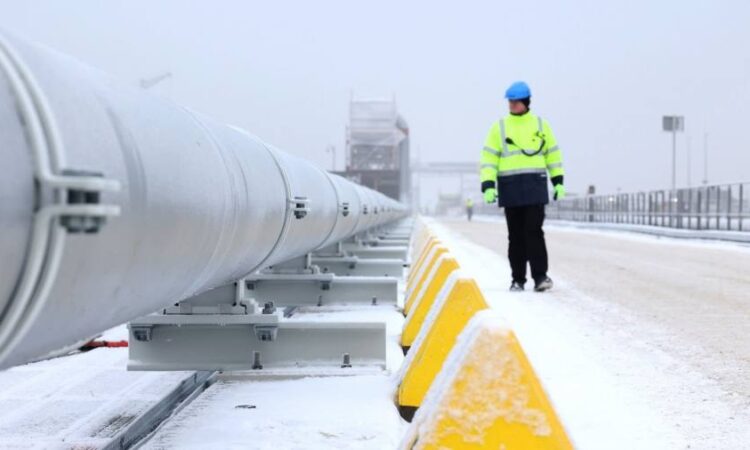
The EU is storing record levels of natural gas after a milder-than-anticipated winter, bolstering hopes that the bloc can wean itself off imports from Russia.
The bloc’s storage totalled 55.7 per cent of capacity at the start of the month according to the industry body Gas Infrastructure Europe — the highest level for early April since at least 2011.
The level is around 20 percentage points above the average for the previous five years, and has risen further to 56.5 per cent in the past two weeks.
“The EU’s gas storages are more than half full, which means we finished this heating season in a comfortable position,” EU energy commissioner Kadri Simson told the FT, emphasising the bloc now has greater scope to cut imports of Russian liquefied natural gas.
“By increasing the share of renewables and further diversifying sources, full phaseout from Russian LNG will be possible for some member states.”
The only other year that comes close to this year’s level was 2020, when the pandemic drastically reduced gas demand. For mid-April the current level is mildly below that of 2020.
The contrast is stark with last year, when Moscow curbed pipeline supplies as it proceeded with its invasion of Ukraine, and the EU was forced to increase its LNG imports from Russia to record levels as it hurried to stock up for the winter.

The EU’s LNG imports from Russia reached 22.1bcm [billion cubic metres] last year, a rise of 39 per cent on 2021, and accounting for 16 per cent of the year’s overall seaborne imports, according to data from Refinitiv.
That surge in Russian imports also helped to bolster the EU’s stockpiles.
“It looks like Europe is going to have too much gas around this summer rather than the other way around,” said Natasha Fielding, head of European gas pricing at Argus Media, an industry data service.
The European Commission has a target of gas storage levels of 90 per cent of capacity by the beginning of November, but Fielding said it could achieve that goal by July or August.
In contrast with oil and petroleum products, Russian gas — which provided almost 40 per cent of the EU’s supply before the Ukraine war — is not subject to sanctions. As a result, the EU’s record imports of Russian LNG to date have funnelled billions of dollars to the Kremlin through taxes on Russian gas companies.

Simson has urged EU companies to stop buying Russian LNG. The bloc’s energy ministers also agreed in March to allow member states to temporarily curb gas imports from both Russia and Belarus — an accord that still needs to be negotiated with the EU parliament.
However, any moves to curb or ban Russian LNG could impede efforts to fill storage for next winter. Globally, new LNG supplies show little prospect of coming through until mid-decade when several large projects come online.
A senior EU diplomat added that a price cap on Russian LNG — echoing measures already in place against oil exports — has not been excluded but it was not yet “a mainstream discussion”.
Analysts also emphasise the impact of Chinese economic growth on LNG demand. They add that the extent of the country’s recovery following the lifting of Covid restrictions remains unknown.
Anne-Sophie Corbeau, global research scholar at Columbia University’s School of International and Public Affairs, noted what she said were signs of “overconfidence” among European policymakers in their efforts to curb Russian LNG.
Gas prices indicate the challenge that traders believe Europe still faces in securing enough supplies, even though spot prices have fallen sharply from last August’s record levels. The price for the European benchmark TTF contract, for delivery in the fourth quarter of this year, has risen by close to 20 per cent in the past month to €55/MWh [megawatt-hours]. In pre-pandemic 2019, TTF prices averaged €14.6.
“Stopping Russian LNG imports could result in various outcomes for the global gas market, including a retaliation from Putin,” said Corbeau.
She estimates that, if current flows continue, the EU will import 40bcm of natural gas from Russia for this year, with 20bcm from pipelines and 20bcm from LNG. She added that “someone has to explain to me” how the bloc would make up the shortfall if it gave up all such supplies.






